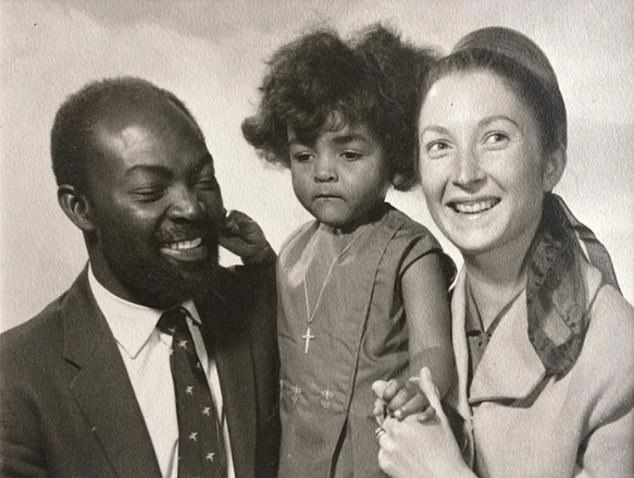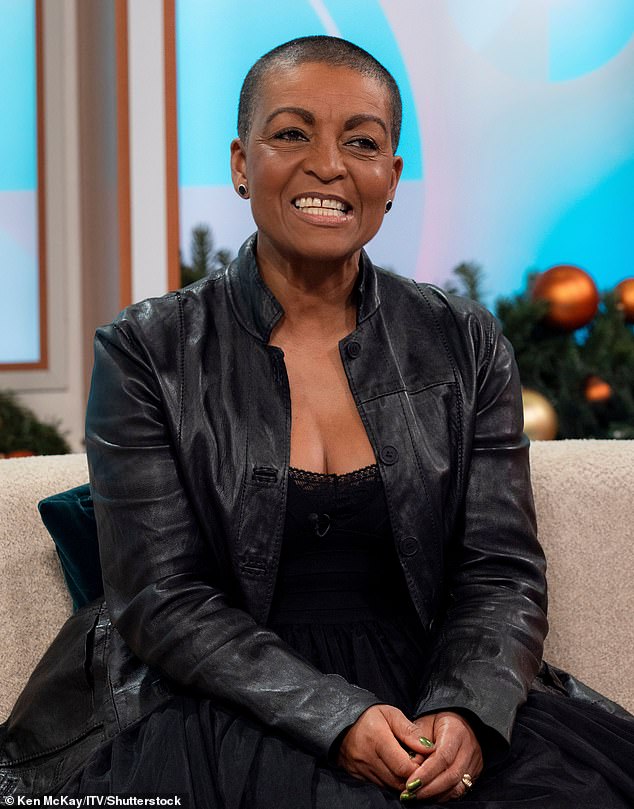Bridgerton star Adjoa Andoh details the vile racist bullying she endured at school before suffering a nervous breakdown following her parents’ divorce
Adjoa Andoh has revealed how racism has destroyed her life – from having her head bashed against the walls in kindergarten, to being denied access to the homes of friends and potential boyfriends, and witnessing her parents' divorce that led to a nervous breakdown.
The actress, 60, born to an English mother and an upper-class Ghanaian father, told how she wouldn't have even been born if her mother's “racist” sister had had her way and prevented her parents' marriage.
The couple eventually tied the knot in a wedding that was boycotted by her mother's side of the family, including her mother's parents.
The Bridgerton star told how the suffering started in kindergarten, where all the school friends she made forced her to leave their house before their parents saw her.
She even became a punk in high school because boys were afraid to date her for fear of getting in trouble with their parents.
Adjoa Andoh has revealed how she was hit by racist bullying in kindergarten, before telling how she suffered a nervous breakdown after her parents' divorce
When asked what her first memory of pain was, Andoh – who played Lady Danbury in Bridgerton – said: “In preschool my head was banged against the wall, and it's a traditional primary school in Cotswold Stone County, so Cotswold Stone is bumpy .
“You know like in the Beano you say 'Gnnhhh!' – all those cries of pain. As my head pounded, I saw stars, but I also saw the cartoon bubble of “Gnnhhh!!” '
She said the violence only stopped when she learned to headbutt people, adding: 'It stopped when I realized I could do something to make it stop.
“I was aware that I was getting hit a lot, and then I was aware that I had to fight back, but I thought that was what happened at school until I was a little older and friends said, 'Oh, we're going to do that. go back to mine, we have to leave before my mother comes because you're not allowed in our house'.
'That would be so and then you investigate that, but I think I must have been at the end of childhood before I had an idea of what that was.
'I had a red knitted dressing gown with a stuffed penguin pocket. I used to steal pieces of chocolate from my mother's bag and go across the road to the chocolate machine and buy bars of chocolate to give to two boys at school.
“I was in kindergarten and got beat up, and I didn't connect why I bought this chocolate and why I gave it to certain kids.
'But when a neighbor informed my mother that I was crossing the road early in the morning and returning with chocolate, I was convinced that she had identified me from my penguin patch dressing gown.

The actress, born to an English mother and an upper-class Ghanaian father, opened up about how she wouldn't have even been born if her mother's 'racist' sister had prevented her parents' marriage
'I thought: why did I wear that dressing gown?' '
Andoah said she was the only black girl at her school and possibly the only one in the Cotswolds at the time.
She said: 'I just thought fighting was for me. We were the (only) black people in the 40, 50 mile radius. We were in the rural Cotswolds.'
Her parents had decided to move to the countryside because her father had experienced racism in Bristol and knew that a disproportionate number of African-Caribbean children were placed in educationally substandard schools in the city.
At the age of 13, racism caused her both mental and physical pain, turning her into a punk.
She said: “I would say I was a punk from late '76 onwards. I would say that in many ways it saved my life in this strange kind of rural existence where I was now in my teens and wanted to go somewhere and do things and be aware of my difference.
“I started wanting boyfriends and people didn't want to be my boyfriend, and they couldn't because that would get them in trouble.”
When she reached sixth grade, she suffered a nervous breakdown, but in an interview with Gyles Brandreth for his Rosebud podcast, she revealed for the first time how racism had contributed.
The prejudice her father experienced at work as an accountant culminated in tension in her parents' marriage, which eventually led to their separation, which in turn would contribute to Adjoah's nervous breakdown.
When asked what the cause was, she said: 'My parents got divorced because life was very stressful for them. I think my father was very unhappy. He never got promoted. He trained people who were then promoted above him.
“I think he was an upper-class Ghanaian man who was suddenly cast into the role of another black man and treated that way. Promoting people who then became his boss and I think it was a bitter pill to swallow.
“My mother was furious on his behalf but couldn't resolve it, and in the end it did for them.”
The irony of the sad breakup was that the couple had only married in the first place because of her mother's opposition to objections from within her own family about marrying a black man.

In high school, Adjoa even became a punk because boys were afraid to date her for fear of getting in trouble with their parents
Andoh, 60, whose father is now in his 90s, said: “She was a maverick, hence she married an African despite all the ill wishes of her family (correct).
“My (maternal) grandmother was very happy to live next door to a Nigerian pastor and be friends and all that stuff, but getting married? There's a whole different conversation.
“So my mother's sister, my Aunt Leah, in today's terms we would call someone who was a racist. And she whispered in her older sister's ear, and she said, 'Jessie, you can't have this (wedding)'.
'Nanna definitely put her foot down regarding the wedding. She took down my grandfather. She had left him, but she had involved him. He was absolutely adamantly against it.
“If you tell my mother that, of course she's going to marry him, and she did, and no one from the family came to the wedding.
'They've all gone on holiday to Cornwall, to Padstow.'
But despite all the trauma, Andoh insists she has no regrets and that it has taught her to work harder to be liked, and may have broadened her horizons and ambitions.
When asked if growing up as the only black girl had improved or damaged her life, she said, “I don't regret anything.
'It gave me an absolute eternal love for nature, it taught me very early on to be self-aware, that I had to make sure people liked me, because they might not like me because of my appearance. And I think that's a terrible burden for a child.
'If I had stayed in the Cotswolds I could have lived a life that would have involved working for Lloyds Bank, getting married, settling down and just staying there forever. That could have been a very nice life, but I don't think that's the life I have the gift for.'
